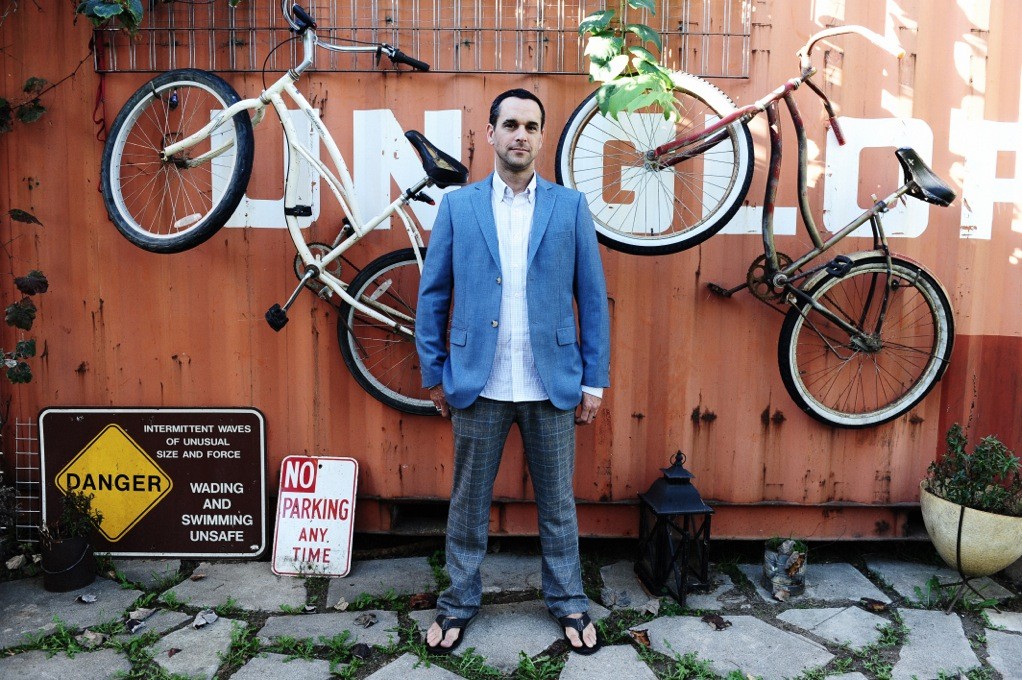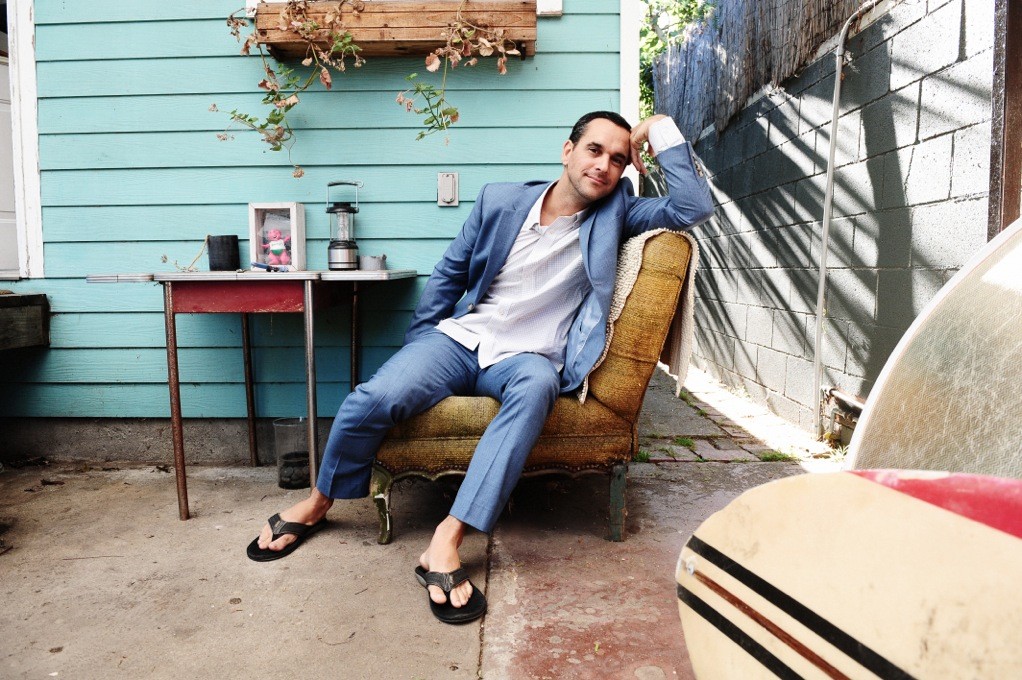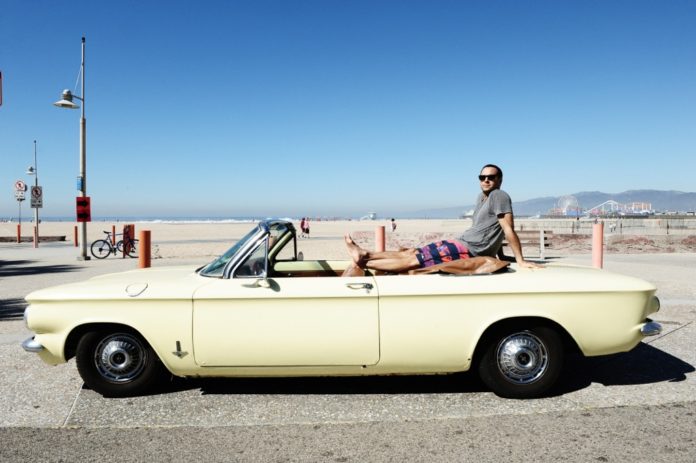By Joanne Cachapero
Native Angelino Kenny Morrison brings business smarts and sound ethics to Venice Cookie Company, a company with a big footprint in two states and an expanding selection of time-tested recipes.
When I ask Kenny Morrison, co-founder of California’s Venice Cookie Company and Washington State’s Evergreen Herbal (which together make up VCC Brands), at the end of our interview if there is anything he’d like to add, he ponders for a moment before answering. “Just that Marco [Hoffman, VCC Brands co-founder and Morrison’s business partner] and I have dedicated our lives to this and that it’s an exciting time for us. We’re going to continue to dedicate our lives to this for as long as we can.”
A native of Venice, California, Morrison is a model of the modern cannabis entrepreneur, with an easy-going style that is reflected in his warm, unassuming home located in, naturally, Venice. With exposed beams and concrete floors, the décor is re-purposed urban retro chic, with a coffee table made from pallets and photography on the walls shot by Morrison in the 1990s. A playful yet obedient pit bull named Boca plays with a giant Kong chew toy while bees buzz in a chayote vine that’s climbed a pole across from a neighbor’s yard, over the roof of a cargo container Morrison uses for storage out back. There are chickens, too, along with tomatoes, peppers, and passion fruit. There are also surfboards, a couple of beach cruisers, and a barbeque grill. Somehow, it doesn’t seem strange for him to be wearing a blue suit with well-worn, old-school flip-flops.
For Morrison, a former photographer and director, life is grand. A corporate video posted on the VCC website provides a glimpse of golden sunlight, cool waves, and tasty edibles. A breezy blonde rides a skateboard on the boardwalk; the stubby deck is a replica of VCC’s most popular product, the 4.20Bar, courtesy of the owner of Carver Skateboards (also a homegrown Venice business), who came up with the idea for the deck. VCC and Carver grew up together, and VCC/EH now gives skateboards away as a special promo. The video also offers a behind-the-scenes look at company operations via a tour of the facilities in California and Washington, revealing a wide range of popular products manufactured, packaged, and distributed throughout both states.
Venice Cookie Company was founded in 2008, early in the evolution of edibles. How did you get your start in the industry?
I befriended the director of a Los Angeles collective, and when he decided to create multiple locations I was instrumental in helping him multiply. That was my introduction to the formal industry. It was a perfect place to get in touch with what the people want and who they are. You know, it was a perfect lesson in who you can attract with your message and the differentiation you can create with your message. After a while, I realized I had fifteen employees at the dispensary, but with fifteen employees manufacturing products, we could be in every dispensary.
Do you create your own marketing in-house? The slogans, like “Peace. Love. Cannabis.” and “Raise the Bar” have real mainstream appeal.
We have an in-house creative agency that we kind of created ourselves. It’s interesting, because they call me the “voice of the brand.” Often they’re like, “You should write something for this…make it sound like it’s coming from you.” I think the general philosophy behind what we’re trying to do and the story we’re trying to tell emanates from me but was largely influenced by my experience working on the dispensary side and reading the work of long-time activists like Steve DeAngelo and Martin Lee.
Are 4.20Bars and Cannabis Quenchers your best-known products?
The brands we’re most known for are the 4.20Bars, Cannabis Quenchers, and the LoudVape cartridges, but we’re always aggressively pursuing R&D. We’re manufacturers and brand-builders at heart and will always create and develop new products.
How do you come up with ideas for new products?
It’s all about the patient. It’s all about the consumer. We like to be good listeners, and we like to give the people what they want. We do a lot of outreach directly to the consumer, whether by myself on social media or me going through emails when people write in to tell us what worked for them and what their favorite products are. But there have also been times when one of our patient/customers has had a bad experience with cannabis, and we bring them in and take them under our wing and allow them to help us develop new products.

Your website has a guide for suggested doses with edible products. Is that information consumers ask for frequently?
It depends. The California patient is so experienced with cannabis that 999 out of 1,000 know what they’re doing and are able to use the products without any help from other people. In Washington, state regulations require a 10mg limit per dose. So, when you start selling products to the uninitiated, it’s very important to limit dosage amounts.
The key difference between the medical user and the social user is tolerance: The medical user has been using it for a lot longer, and has a much higher tolerance and needs a larger dose, while the recreational user who didn’t want to explore cannabis until it was totally legal has a more sensitive tolerance. We’re also finding that most people use the products for the same reason, whether they’re a medical user or a social user. Consumers come into the store asking the same questions: “What will help me with my sleep?” or “What will help me with my pain?” It’s actually a shame that in Washington, stores are not allowed to answer those questions, but it’s a process.
What’s your advice for dispensary operators on how to sell edibles?
We’re seeing a lot of change in merchandising in the stores, and there’s finally kind of a land-grab for shelf space in the stores. We’re starting to hear from some dispensary owners, “Oh, I’m running out of shelf space…”
Whether it be regulations in certain states or the lack of understanding regarding the art of merchandising, a lot of people seem to display and showcase products as if they were diamonds. They show one piece in the countertop under glass. But some places are finally catching on.
There’s a book titled Why We Buy by Paco Underhill that helps explain merchandising. I think people can spend a little more time showcasing products in terms of highlighting the abundance. If you’re showing one chocolate bar for sale, it’s not as tantalizing as showing a point-of-purchase display with twenty chocolate bars for sale. People are starting to take cues from mainstream retail stores, and people need to do more of that.
In Washington, the law mandates everything be kept behind glass or inside a locking glass cabinet, which creates certain issues regarding showing a multitude of the same item. But I think as time goes on, manufacturers and retailers will discover more creative solutions to obstacles like that.
 How many dispensaries are you in?
How many dispensaries are you in?
We’re not comfortable giving out that number for publication, but we have both of the states pretty well covered.
How’s the demand for product? Do you ever run out of inventory?
If we find ourselves running out of inventory, we’re doing something wrong. We never run out of product in California, ever. That’s one key difference between us and our peers—we never run out of an item. The supply chain is a little more complicated in Washington, though. With the transition to a newly regulated market, there’s been a little bit of a learning curve and, at times, there have been shortages simply because not all aspects of the supply chain have been ironed out yet. We’ve been blessed to get our regulatory feet wet in our state of Washington, so when we get regulations out in California, we’ll be ready for them.
What have been your greatest challenges and rewards while building VCC and Evergreen Herbal?
The greatest challenge was starting the California company, and the greatest reward has been starting the Washington company. In California, for many years the only thing that was illegitimate about our business was the way we were treated, the fact that we were forced to do everything in an underground manner. We offered health benefits to our employees, paid a living wage far above minimum wage, had workers’ comp insurance and operated compliant kitchens. We pay payroll taxes and the IRS—everything completely above board. We are trying to be a shining light and an example for the future of the cannabis industry and prove to the world what this industry can become.
The biggest reward has been relocating to Washington and taking the Seattle Fire Department through our extraction facility. We built the first Class One-Division One extraction facility in the state of Washington for cannabis, and to take King County officials on a tour through our facility and allow the Seattle Fire Department to train in our facility were things that brought tears to my eyes. To go from an underground, hush-hush environment in California, where the only way to survive was to keep certain aspects and certain information to ourselves. In Washington, we actually got a chance to advise on the creation of the legal cannabis industry by bringing in all of the good manufacturing practices and standard operating procedures we created in California. So, to have everything we created in California validated by the various agencies and bureaucracies in Washington was a huge reward and a really big moment for Marco and me, personally and professionally.
What about CBD?
Check this out: This is totally counterintuitive, but our No. 1 chocolate bar in the adult, or so-called ‘recreational’ use, market is the CBD bar.
Why?
Customers who are new to cannabis are hearing on television that CBD is an amazing molecule with amazing therapeutic potential, and they want to try it. Guess which chocolate bar is the worst-selling in the medical market in Washington? The CBD bar. Isn’t that amazing? We’re the first people to come out with a CBD bar in the recreational-use market and it quickly became the No. 1 chocolate bar we made, and the industry followed us and started making CBD products for the adult-use market.
How is the recreational market in Washington taking off? I read in Forbes that your sales have been catching up to revenue generated by medical sales?
There are only sixty or seventy medical stores left. The state has been very effective at reducing the number of medical access points, and the last sixty or seventy stores that are left in medical should soon be transitioning to adult-use and retail sales. That article is dated already but it’s a function of the medical stores closing and the adult-use stores expanding and growing.
The next big challenge for Washington is going to be how to continue serving the medical market, especially at a price point that works for patients. The price per milligram in adult-use is a lot higher, so you’re having all these medical users being displaced by stores closing, and the prices of the products they rely on skyrocketing in the adult-use stores. As a result, our medical sales were through the roof because people were basically stockpiling, afraid they’re going to lose access.
It’s my hope that the so-called “recreational-use” stores actually reinforce the notion of therapeutic cannabis. The naysayers were afraid medical marijuana was a slippery slope to legalization, but what we’re noticing is that out-and-out legalization is a slippery slope to people gaining a better understanding of the therapeutic qualities of cannabis.
Are you looking forward to full legalization in California?
Definitely. California is the eighth-largest economy in the world. We plan on being a part of legal, adult, social-use cannabis. We plan on continuing to tell our story, whether the consumer is using cannabis for therapeutic reasons or social purposes.
Any expansion plans into other states?
We’re looking everywhere. We’re talking with people in multiple states: Colorado, Oregon, Hawaii, Nevada, and Arizona. We’re involved in discussions everywhere. We went from California to Washington, and that was because we wanted to canvas the West Coast first. Now it’s time to start heading eastward. Colorado definitely has the most mature market out there. A lot of other states are still figuring things out, but since Colorado is the most mature market, that’s where we want to head next.
Are you still excited by the work?
Absolutely. Every day is exciting; the amount of opportunity is increasing exponentially, by the day. The phone’s ringing like crazy.








